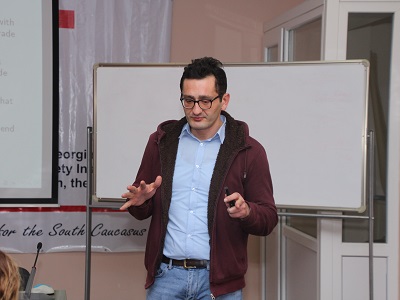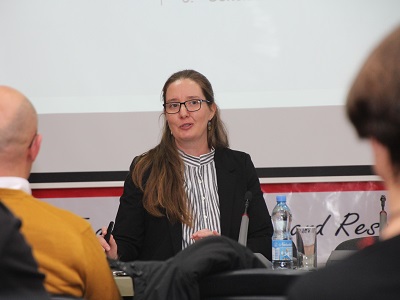One of ISET’s core values is to provide its students with an international academic environment. One of the key aspects of this mission is the academic seminars the institute periodically hosts; many outstanding scholars have visited ISET to present their research results and discuss issues in the focus of academic circles all over the world. This helps students with their studies, find their own interests, and remain up-to-date with the most recent academic trends worldwide.
It is, however, doubly special when an alumnus returns to meet his fellow ISETers. Dr. Lasha Chochua, who graduated from ISET’s MA program back in 2008, just recently defended his PhD thesis with the job market paper entitled ‘The Farsighted Stability of Global Trade Policy Arrangements’ in Bielefeld University, Germany.
On January 29, ISET was pleased to host Prof. Michael Beenstock for a seminar-workshop. Prof. Beenstock is the author of ten books on topics including time series and spatial econometrics, macroeconomics, the global economy and economic development, as well as writing more than 100 refereed journal articles. He presented the preliminary findings of a research project entitled “The Puzzle of Economic Development without Rural-Urban Transition in Georgia.” The project was undertaken by the Shota Rustaveli National Science Foundation and an ISET research team.
“Manchester is known for two things: 1) Manchester United and Manchester City, 2) I was born in Manchester,” said Prof. Beenstock at the very beginning of a presentation. The third point fame for the city, which is more important for Economic Science, is Victoria University of Manchester. Here, Arthur Lewis wrote his seminal work in Development and Growth Economics for which he was awarded the Nobel Memorial Prize in Economics in 1979. Lewis provided a structural theory of economic development which explained the correlation between urbanization and development in the past, and which would also predict it in the future. The Lewis and Harris-Todaro (Harris and Todaro 1970) models have become canons of textbooks on development economics, and rural-urban transition is now regarded as an inevitable and ubiquitous consequence of economic development.
On December 13, Ellie Martus, a co-fund fellow at the University of Warwick, visited ISET to talk about environmental state capacity in Georgia and other countries of the former Soviet Union. She presented an overview of her research, under the framework of which she is going to explore the capacity of Georgia, Russia, Ukraine and Armenia to design, implement and enforce environmental policies.
Ellie Martus analyzed Georgia’s environmental state capacity in four dimensions: regulation, administration, ideas and expert knowledge, and sites of contestation. With the help of surveys and interviews among governmental entities, NGOs and environmental groups, she revealed several challenges in all of the above-mentioned dimensions and presented her results to the ISET community. She finished by giving general tentative recommendations, and explained that the final conclusions will be shown later, as she is going to continue her research on the topic in Georgia and other select post-Soviet countries.













